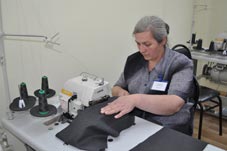Opening of Sewing Factory in Berbuki
Friday, July 1


„This project is extremely important because if you a roof over your head but no bread on the table, your family can not survive. Employment is crucial and this is why UNHCR is doing this project,” Simone Wolken said. „Many internally displaced persons reside in this are and are looking for job, and because they have difficulties in finding work, every initiative is important. This sawing factory is one project that we have undertaken, but we have already opened chicken farm and greenhouses, for example. All this is a part of concept to make sure that people have roof over their heads, food on the table and children go to school and family can live dignified life.”
The factory which covers 200 sqm will start their production with 500 uniforms for pupils from three former buffer zone schools in Shida Kartli, and will permanently employ 20 locals and internally displaced persons (IDPs).
„We have received our first salary already and it is a big change for us. Of course, having a job and doing things what one likes is important, but for also money is extremely important“, says Larisa Chighladze, an internally displaced persons from Tskhinvali who is now employed at the sewing factory. „My average salary 280 lari but we all hope that after some time the factory will develop even more and also our salaries will be increased.“
Before Chighladze was employed at the sewing factory, the only income in their family of six persons was earned by her husband, who worked as a carpenter. But since the construction business is not so active as before it became very difficult for him to find a job.
„I used to work as a tailor in Tskhinvali and have such an experience but the training we got in framework of this project is very useful. During last 25 years many things has changed and there are new technologies,” Chighladze told.
The community-based organization (CBO) “Sewing House – Berbuki” was established in the framework of this project and involves 18 IDP families.
„It is very important to have IDPs employed which for them means to be more free in their possibilities and sustainability. It is important to achieve a level when IDPs won‘t depend on one-time assistance and we are working on this. We want 100 percent employment of IDPs and today this is a good example,” Subeliani said.
All members of the CBO were trained in new sewing technologies, management and marketing and the project thereby helps to create new jobs.
Apart from school uniforms, the factory will produce sports tricots, bed sheets and pillow cases. In future it plans to produce also banners, bags and other types of visibility items.
„The goal of local government is to create new job opportunities as much as possible. Every single person who is employed is very important for us“, Shida Kartli Governor said.
The sewing factory was constructed by UNHCR and its implementing partner, the Institute for Regional Development-Shida Kartli (IRD-SK) with funding from the US Department of State.
